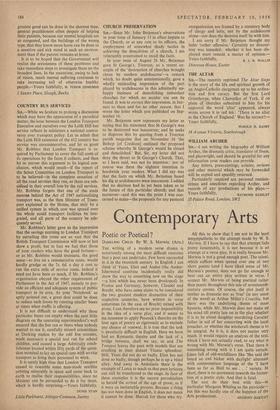SIR,—While we hesitate to prolong a discussion which may have
the appearance of a parochial matter, the issue between the London Transport Executive and ourselves over the Leith Hill bus service reflects in miniature a national contro- versy over transport policy. Let us admit that the Leith Hill extension of the 412 country bus service was unremunerative, and let us grant Mr. Robbins that London Transport is re- quired by Parliament to cover the full costs of its operations by the fares it collects, and then let us pursue this argument to its logical con- clusion, which would result—if the report of the Select Committee on London Transport is to be believed—in the complete cessation of all the road services they run, as these are sub- sidised in their overall loss by the rail services. Mr. Robbins forgets that one of the- main reasons behind the Act of 1947 nationalising transport was, as the then Minister of Trans- port explained to the House, that only by a unified system in which, cost was spread over the whole could transport facilities be inte- grated, and all parts of the country be ade- quately served.
Mr. Robbins's letter gave us the impression that the savings accruing to London Transport by curtailing this route are so vast that the British Transport Commission will now at last show a profit, but in fact we feel that those of your readers who have the good fortune— or as. Mr. Robbins would insinuate, the good sense—to live on a remunerative route, would hardly grudge us the 7s. 6d. a day it cost to run the extra mile of service route. Indeed it need not have been so much, if Mr. Robbins's organisation obeyed the other requirement of Parliament in the Act of 1947, namely to pro- vide an efficient and adequate system of public transport in its area. As your 'Notebook' so aptly pointed out, a great deal could be done to reduce such losses by running smaller buses at times when traffic is offering.
It is not difficult to understand why these particular buses ran empty when the neat little diagram on the operating superintendent's wall ensured that the bus ran at times when nobody wanted to use it, carefully missed connections at Dorking station by the odd five minutes,
made necessary a special taxi run for school childien, and caused a large Admiralty estab-
lishment located within fifty yards of the quon- dam terminal to lay on special runs with service transport to bring their personnel to work.
It is surely high time that London Transport ceased to resemble some man-made satellite orbiting miserably in space and came back to earth to realise their responsibilities, since no Minister can be persuaded to do it for them, which is hardly surprising.—Yours faithfully,
DENIS RYAN
Little Parkhurst, A binger Common, Surrey


































 Previous page
Previous page